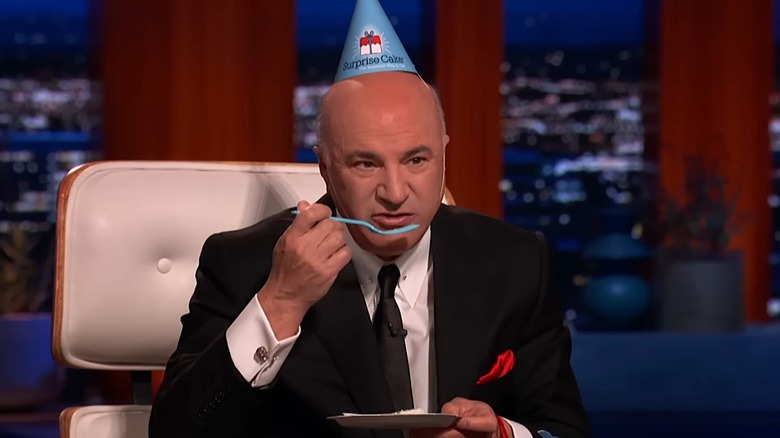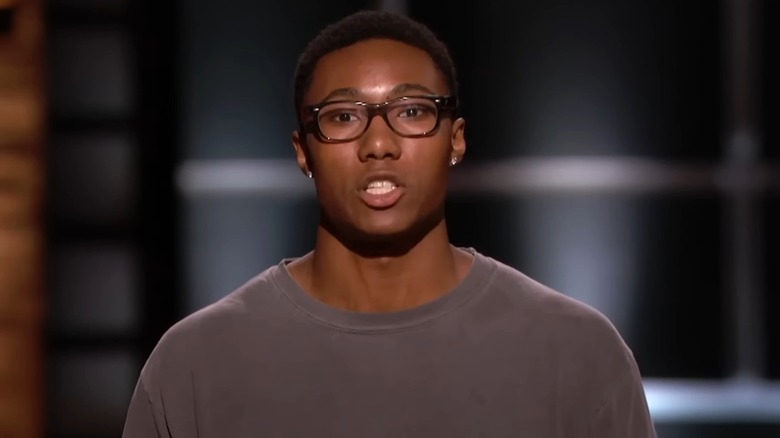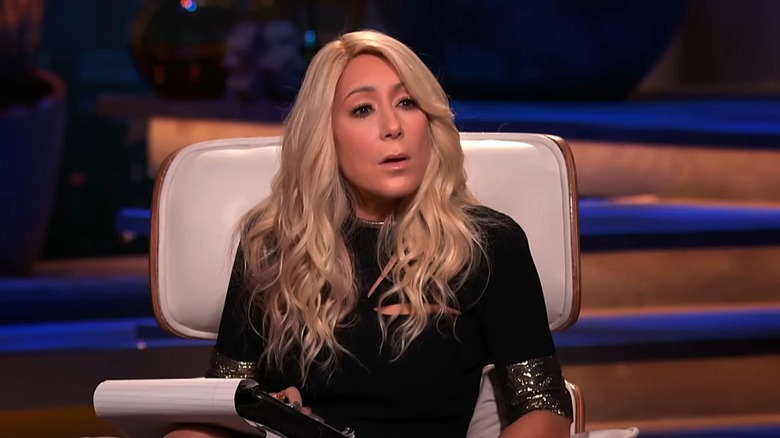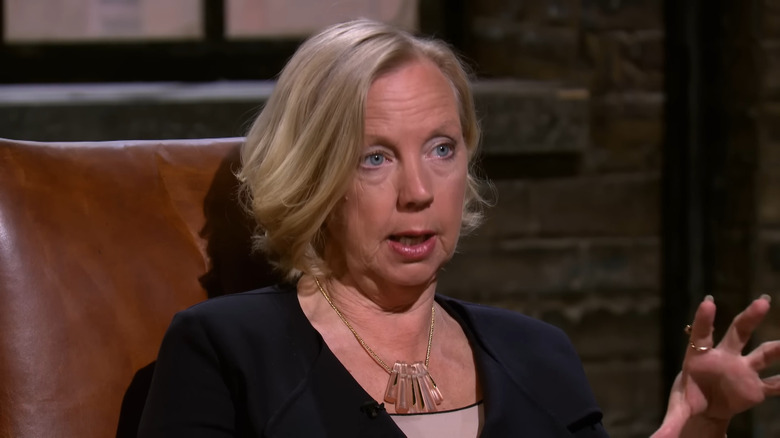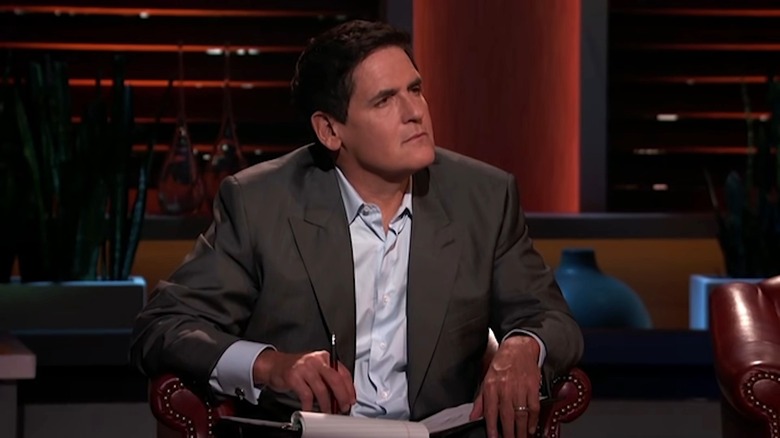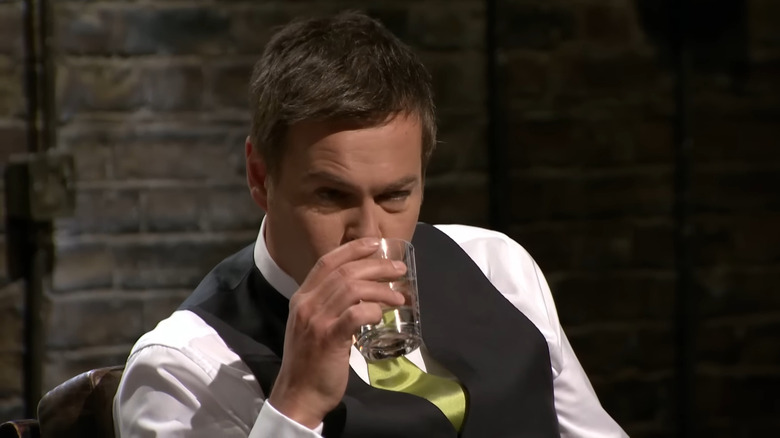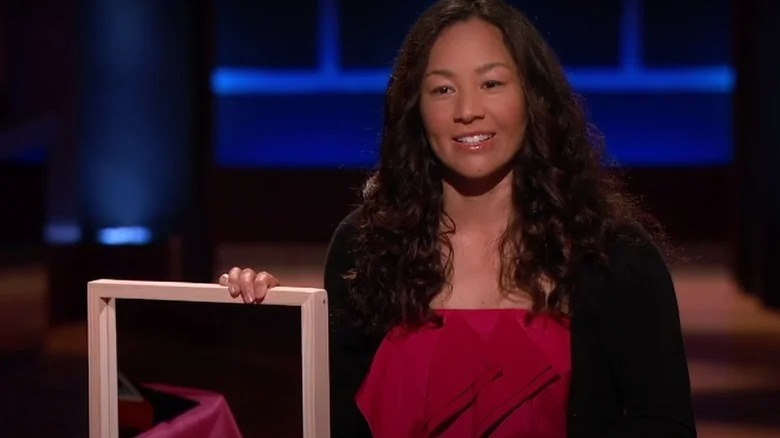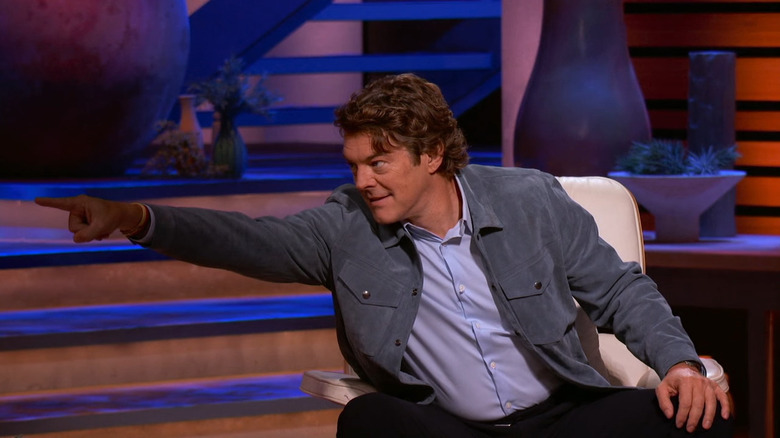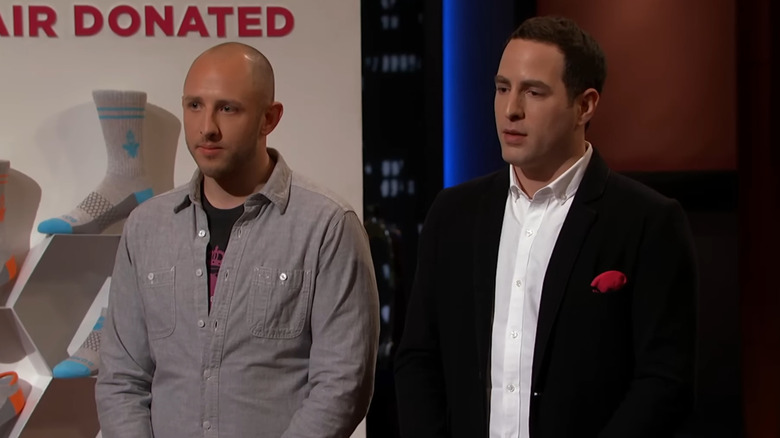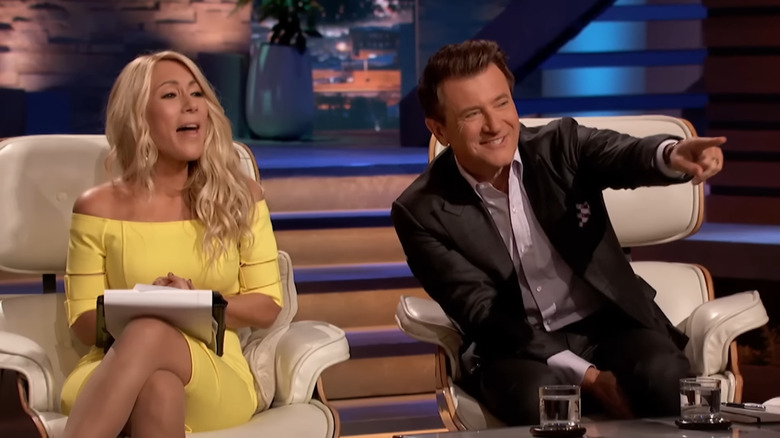Shark Tank Vs. Dragons' Den: Which Show Is Better (And Why)
On a surface level, "Shark Tank" and "Dragons' Den" come across as the same show. Contestants stand in front of a group of judges and pitch them their business idea in an attempt to gain funding. In most cases, drama unfolds as the judges poke holes in the presentations and business plans, while viewers wonder if anyone will put up their money to see a hopeful entrepreneur's dreams fulfilled. The only difference between the programs is that one's produced in America and the other in Great Britain, right? Not quite.
Despite "Shark Tank" and "Dragons' Den" having the same premise, the execution and format differs, as well as the overall tones of the respective shows. From the judges' approach toward the contestants to the pure entertainment factor and what it teaches everyone about business, the two shows package themselves differently. As such, people are bound to think that one is better than the other. Of course, it comes down to personal preference and taste, since television is subjective. However, it's definitely possible to compare the two shows using certain criteria in an effort to see which is superior — and that's what is about to happen here.
So, grab a sword and a snorkel as we enter the den and the tank to uncover which is really the better show. Please note: No Sharks or Dragons were harmed in the writing of this feature.
Dragons' Den has been around for longer, though Shark Tank also has longevity
Is this a chicken and egg scenario? No. There's a clear winner in terms of who came first here: "Dragons' Den." The British show started airing in 2005 and has run for 21 seasons and counting. That said, the format of "Dragons' Den" is inspired by the 2001 Japanese show "Tigers of Money," so it wasn't exactly a novel idea to begin with and owes its origins to its Asian predecessor.
"Shark Tank" swam its way onto American screens in 2009. Since then, it has snapped up the viewers for 16 seasons and counting. Like "Dragons' Den," international versions of the show materialized across the board with the likes of "Shark Tank Brazil" and "Shark Tank Bangladesh" airing in their respective countries. Interestingly enough, "Shark Tank" was almost axed after just one season. The show's format was different then as it didn't have celebrity Sharks or the pizzazz of now, even featuring the Sharks sitting behind desks at one point. However, a tweak to the format occurred and it ended up becoming a big-time hit for ABC.
"Dragons' Den" edges out "Shark Tank" in terms of having been around for longer; however, no one can dispute that both shows tasted success pretty early and stayed culturally relevant after their respective debuts.
Shark Tank uncovers more about its contestants' lives
Scroll through any company's website and one element pops out: A backstory. It's usually brief but provides an understanding of who formed this business, when, and why. Similarly, both "Shark Tank" and "Dragons' Den" cover this basis. At the same time, it's also a neat trick to see how long a business has been in operation and what it has achieved since its inception.
However, "Shark Tank" creates a more personal touch with its contestants. The Sharks often ask more personal questions about the contestants' lives in an effort to find out more about them. Take the case of Ryan Diew and his Trippie app that appeared on "Shark Tank" as an example. Diew revealed to the Sharks why he created the app and a bit more about the mechanics behind it. The Sharks noticed he was a young man and asked more about him and his life. Of course, his pitching session nosedived after he claimed he didn't have "a rich uncle" and proceeded to get a little too personal about his circumstances.
To be fair, this is a hallmark of American reality television series, as even shows like "American Idol" and "America's Got Talent" love to focus on contestants who have juicy or tragic tales to tell to the world. Whether they're true or not is another matter altogether. In comparison, it's rare to see "Dragons' Den" give too much airtime to a contestant's personal story unless it's pivotal to the pitch.
The Shark Tank set looks incredible, while the Dragons' Den set feels more like a boardroom
For anyone who watched the first episodes of "Shark Tank" and "Dragons' Den" and remained a loyal viewer right up to the latest ones, there's no disputing that both shows went through aesthetic changes over the years. However, there's a night and day comparison when looking at the sets: "Shark Tank" catches the eye with a reality show-inspired setup, while "Dragons' Den" comes across as every other boardroom in a corporation. Fans love the "Shark Tank" design, too, with one person pitching it as a potential Lego set on Lego Ideas.
"Shark Tank" experienced a noticeable change to the set around its ninth season, and this was entirely intentional, as executive producer and showrunner Clay Newbill told Reality Blurred. Newbill explained how small changes take place between every season to freshen up the production, but the decision was made to make the set "more modern, more contemporary" for Season 9. He credited production designer Anton Goss and his team for the work, stating that "the first set of renderings he gave us, that's what you see, pretty much, which is amazing."
In addition to the set changes, "Shark Tank" also shuffles the pack in terms of where the Sharks sit. Newbill compared it to school and how people become closer to the ones they're seated next to after time. So, to shake up the show's established relationships and introduce new dynamics, they move the Sharks around to spice up affairs.
Dragons' Den operates with a more professional mindset
Look, at the end of the day, "Dragons' Den" and "Shark Tank" are television programs. This means entertainment reigns over real-life authenticity and reactions. In a professional work environment, it's unlikely that investors or pitchers would speak to each other like they do on these shows (unless it's a toxic workplace, then everyone should run for the hills). Everything is amplified to 11 in an effort to hook the audiences on the drama and the "I can't believe they said that to the poor contestant" feeling.
That said, the Dragons don't often venture into the personal domain. Yes, they might be a little spicy and condescending toward the contestants from time to time, but, to use a soccer analogy: They play the ball, not the player. The Dragons criticize the viability of the business and whether they should invest in it or not rather than the person who came up with the idea.
On "Shark Tank," it hasn't been unusual for Mark Cuban to call out contestants and even accuse them of selling him scams. Kevin O'Leary, aka Mr. Wonderful, also isn't always "wonderful" to participants on the show, either. Look at the incident with Maneesh Sethi and his product Pavlok on "Shark Tank," for instance. Sethi said he would welcome the chance to work with any of the Sharks, except for Mr. Wonderful. While he could have cushioned his statement better, it's his personal choice whom he chooses to partner with given the opportunity. The Shark responded in anger, saying, "Maneesh, you're an a–hole. Get the f–k out of here."
Shark Tank's Sharks have all the personality
Reality series need a mixture of personalities. Not everyone can be a Simon Cowell or Howie Mandel. Consequently, producers choose different hosts or judges that intentionally clash or create a specific dynamic for the show. In the case of "Dragons' Den," the likes of Peter Jones and Deborah Meaden often take the role of the bad cop and judge more harshly, while someone like Steven Bartlett plays the good cop and tends to inspire the contestants with a kinder approach.
Across the pond, the Sharks on "Shark Tank" smell blood and never miss a beat to snap at the contestants' ankles and self-confidence. Mark Cuban and Mr. Wonderful certainly don't mince their words, coming across like they're putting in their best auditions to be the next judges on "America's Got Talent." They cut off the participants, tear them down, and often venture into the nasty side of reality television. While they hide behind the concept that entrepreneurship is hard and people need to get used to hearing the harsh truth, there's clearly an element of hamming it up for the cameras. It also isn't out of the ordinary to see Sharks fight among themselves and throw shade at each other to secure the deal.
Naturally, this all comes down to editing and presenting the story the way the producers want it to be told — British viewers simply don't go in for the same kind of sensationalism that is commonplace in the world of American reality TV. Make no mistake, though: The "Shark Tank" Sharks possess a flair for the dramatic that "Dragons' Den" Dragons could only dream of.
Dragons' Den allows for pitches to breathe
On television, the pitches on "Dragons' Den" and "Shark Tank" look short, snappy, and to the point, but this isn't how it goes down in real-life business pitches. They're longer winded, and people tend to stumble over their words when they're nervous. Then, there are the questions and comments from investors that also take up a good chunk of time. Expectedly, the segments for television are edited down to fit neatly into the allotted time slots and to allow for commercials to air at the most dramatic moments.
The average length for an in-person "Shark Tank" pitch is 45 minutes and it's packaged into a 15-minute segment. In 2013, Robert Herjavec disclosed that the longest pitch the Sharks had been a part of was two hours in length. Now, that certainly wasn't shown on television, because that would be a double episode by itself. Although, one of the rules everyone has to follow on "Shark Tank" is to commit to a two-hour taping session per pitch, so it might not be too uncommon.
At the end of the day, "Dragons' Den" does a better job of letting the pitches flow rather than editing them down to a pulp. The British series showcases more of the pitch and feedback from the investors than its American counterpart. Of course, the pitches still undergo a rigorous amount of editing to gather the juicy bits and heighten the drama for the people watching at home, but the pitches we see on "Dragons' Den" often feel more complete and organic.
Shark Tank has more outrageous pitches
Much like on "American Idol" and "The Voice," there are contestants who appear on "Shark Tank" and "Dragons' Den" who shouldn't have done so in the first place. Whether it's because they don't have a solid business idea or they create a strange product or service that's unnecessary, they provide entertainment to the audiences watching at home who cringe when the Sharks or Dragons tear into them. It's uncomfortable viewing, but what possessed these people to go on television to present their ideas in the first place? Both shows have featured their fair share of head-scratching pitches, though "Shark Tank" takes the cake when it comes to the most outlandish ones.
A good example is Belinda Jasmine and her Skinny Mirror product, which featured in Season 7 and is easily one of the best "Shark Tank" episodes ever produced. Jasmine sought a $200,000 investment from the Sharks in exchange for 20% equity in her company. While Jasmine's intentions of promoting body positivity were noble, the product is too similar to the effects of a funhouse mirror. Essentially, what it does is deceive the person into thinking they're two sizes smaller than what they are. Mr. Wonderful flat-out accused Jasmine of lying to people. He was so offended by the product that he said: "I'm out, but I also forbid any other Shark from investing in this."
Shark Tank brings in stellar guest Sharks
Both "Shark Tank" and "Dragons' Den" invite guest judges on the shows in an effort to draw more eyeballs to the programs and encourage more investment from outside sources. "Dragons' Den" has featured the likes of former Manchester United soccer star Gary Neville and fashion designer Emma Grede on its episodes; however, "Shark Tank" goes all out to bring in supreme Sharks. Some of the guests have included Hollywood superstars Gwyneth Paltrow, Kevin Hart, and Ashton Kutcher, as well as A-list business players like Richard Branson and sports stars such as Maria Sharapova and Charles Barkley.
One notable guest was Blumhouse Productions CEO Jason Blum, who appeared on an episode of "Shark Tank" Season 15. He ended up being so impressed by contestant Scott Cramton's interactive murder-mystery pitch that he invested $350,000 of his own cash for 10% in the company. In a statement (via The Hollywood Reporter), Blum said: "Scott Cramton has built up a tremendous business in The Murder Mystery Company and American Immersion Theater. His dedication to bringing guests not just a show but a bespoke, thrilling narrative is an exciting concept to our ambition in immersive experiences of all kind."
Shark Tank's successful investments are better known around the world
While "Dragons' Den" and "Shark Tank" can both lay claim to investing in burgeoning businesses, there's no denying that the "Shark Tank" effect is real, as entrepreneurs claim to receive a boost in sales and popularity after appearing on the show — even if no Shark invests in their ventures. In addition to this, "Shark Tank" has bragging rights over "Dragons' Den" since a lot of its top products have picked up steam in the mainstream consciousness.
A good example of this is Bomba Socks, which is the best-selling product to come out of a "Shark Tank" deal so far. The premise behind the business is simple: People purchase a pair of socks and donate another pair to charity. Shark Daymond John invested $200,000 for a 17.5% stake in the business and it turned out to be a wise move: The company has made over $1.3 billion in lifetime sales.
Other examples of successful business include Everly Well and Scrub Daddy. Shark Lori Greiner has provided updates about both on her website, revealing that the former did $300 million in sales four years after appearing on the show, while the latter smashed past $400 million nine years later. The Sharks must be smiling about all the deals that reaped rewards in the end.
Shark Tank proves to be the better show, but Dragons' Den teaches us more about business
So, taking all of this into consideration, what's the conclusion here? Well, there's no disputing that "Shark Tank" establishes itself as the better reality show. It has the magic of showrunner Mark Burnett behind it, and if there's one thing that Burnett knows, it's reality television. Burnett (who, rather ironically in the case of this article, is British) is the mastermind behind shows like "Survivor," "The Apprentice," and "The Voice," so it's no surprise his Midas touch extended to "Shark Tank," too. From a pure entertainment perspective, the American series knows how to drum up the excitement, stir up the drama, and let the personalities shine to the delight of the audience.
That said, "Dragons' Den" stands out as the more business-centric and educational show. Listening to the advice from the Dragons and watching the presentations, entrepreneurs can learn more from this program than they can watching "Shark Tank." It's more realistic and less Hollywood. Ultimately, it's about what a viewer wants to get out of a show. If they're looking for typical reality show shenanigans, "Shark Tank" is the way to go. However, if they want to actually learn something that they can apply to their own business ventures, it's worth checking out "Dragons' Den."
